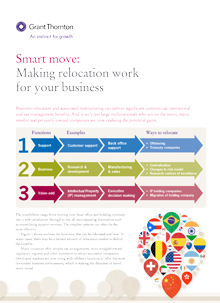-
Business risk services
Organisations must understand and manage risk and seek an appropriate balance between risk and opportunities.
-
Cybersecurity
As organisations become increasingly dependent on digital technology, the opportunities for cyber criminals continue to grow.
-
Business consulting
We can formulate solutions to keep you ahead of disruptive change.
-
Valuations
Our valuation specialists blend technical expertise with a pragmatic outlook to deliver support during transactions, restructuring and disputes.
-
Transactional advisory services
Helping you with successful growth deals throughout your business life cycle.
-
Recovery and reorganisation
Workable solutions to maximise your value and deliver sustainable recovery.
-
Mergers and acquisitions
Strategic growth decision making. Globalisation and company growth ambitions are driving an increase in M&A activity worldwide.
-
Forensic and investigation services
Rapid and customised approach to investigations and dispute resolution.
-
International Financial Reporting Standards (IFRS)
Our member firm IFRS advisers can help you navigate the complexity of the Standards so you can focus your time and effort on running your business.
-
Audit quality monitoring
A key component of our global strategy is to promote the delivery of consistent, high quality client service worldwide.
-
Global audit technology
We apply our global audit methodology through an integrated set of software tools known as the Voyager suite.
-
Corporate and business tax
Growing businesses need strong tax management to meet current and future tax liabilities and we can help you achieve this, whatever challenges you face.
-
Direct international tax
We have the insight and agility to create the strategies you need to respond quickly to ever-changing tax laws.
-
Global mobility services
In a globalised world, businesses must work seamlessly across borders. Organisations operate in multiple countries and view international expansion as a strategic objective.
-
Indirect international tax
With more goods and services crossing national borders than ever before, you may be facing indirect tax obligations in many countries – even those where your customer is located.
-
Innovation and investment incentives
Dynamic businesses must continually innovate to maintain competitiveness, evolve and grow. Valuable tax reliefs are available to support innovative activities, irrespective of your tax profile.
-
Private client services
Protecting business and personal wealth is of upmost importance for private clients worldwide. At Grant Thornton, we bring reason and instinct to all aspects of your personal finance and compliance planning.
-
Transfer pricing
The laws surrounding transfer pricing are becoming ever more complex, as tax affairs of multinational companies are facing scrutiny from media, regulators and the public.
-
Tax policy
Grant Thornton’s teams can work with you to help you understand these regulations, develop a strategy tailored to your business’ individual tax needs and manage tax risk around the globe.
-
Business process solutions
As organisations grow, back office processes and meeting reporting requirements across multiple jurisdictions can become a distraction. We remove the burden of back office operations and worries about compliance to enable you to focus on growth.
How can relocation add value?
Business relocation and associated restructuring can deliver significant commercial, operational and tax management benefits. And it isn’t just large multinationals who are on the move, many smaller and privately-owned companies are now realising the potential gains.
Why move – the value of relocating
As the focal points of global demand and talent shift South and East and the pressure to minimise costs and improve operational efficiency continue to mount, the rationale for relocation is becoming ever more compelling.
Even if you haven’t yet considered the options, you’re likely to face probing questions from analysts and investors about how the various relocation options compare to your current structures and whether you could be losing ground to competitors as a result of not making a possible move. So how can relocation add value?
1. Going where the growth is
It’s important to ensure that key operations and decision making are aligned with where you see the biggest opportunities for investment and growth. Many internationally mobile employees will want to gravitate towards the main focal points of growth. Shifting demographics and changing labour costs also mean that you may need to seek out new sources of talent.
2. Sharpening cost competitiveness
Relocating to an offshore location can generate significant operational and administrative efficiencies, which could be critical as margins come under pressure in slow growth markets.
3. Easing compliance headaches
Many countries are imposing more complex compliance regimes. This is creating a huge burden for groups and is arguably accelerating the migration of businesses away from some of these markets.
4. Seeking more efficient tax arrangements
Many governments are adjusting their tax regimes to help encourage companies to relocate and create jobs within their markets. Particular areas of focus include IP management and other high-value functions.
Developing the right solution
- Model your supply chain and identify key value drivers. This will help you identify areas where relocation/restructuring could add value.
- Determine which functions and assets could, should or should not be relocated, and assess possible locations.
- Undertake feasibility and cost-benefit analyses. This shouldn’t just look at the costs, but also any potential reputational issues.
The choices that emerge from these evaluations may prove very different from what you originally envisaged. While these assessments are likely to identify a number of challenges, most can be managed with
the right structuring and planning. What you cannot afford to do is simply consign relocation to the ‘too difficult pile’ as you could lose out to competitors as a result.
See also…
A global guide to business relocation
This guide includes detailed country profiles across 26 countries and an overview of an additional 32 countries. With the current considerable complexity, mitigating risk is crucial. Grant Thornton has significant experience in advising clients on how their businesses can benefit from relocation. Talk to your local firm about how Grant Thornton can help your organisation reach its growth potential.

